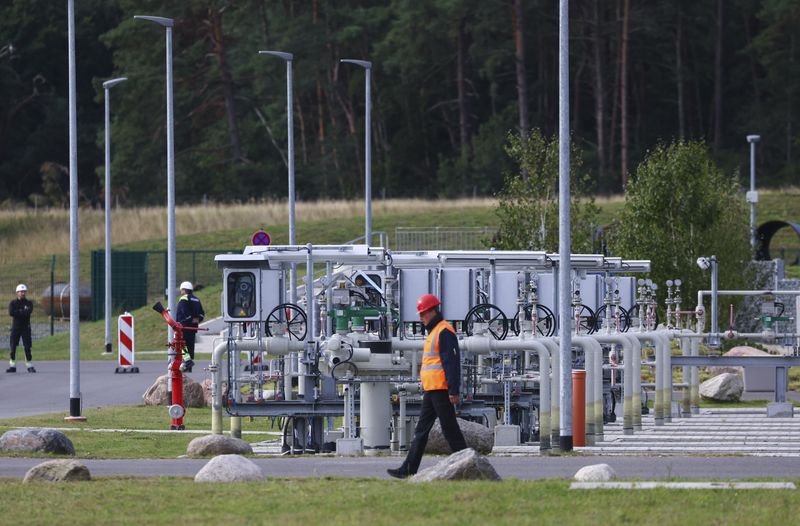By Victoria Waldersee
BERLIN (Reuters) - Germany has managed to fill its gas reserves to 91.32% of capacity, allaying fears it could run out this winter after Russian gas flows fell sharply following European sanctions over the invasion of Ukraine - but it has come at a price.
One in ten mid-sized companies, which provide nearly two thirds of German jobs, have cut or halted production because of gas prices, according to a September survey of nearly 600 mid-sized firms by business association BDI, reducing demand.
Some industrial giants in particular gas-heavy industries like chemicals have begun shifting production and sourcing from elsewhere, while others are switching from gas to coal or oil - spelling trouble for their carbon footprint.
Below is an overview of what steps some of Germany's biggest industrial firms have taken to reduce their gas intake in anticipation of winter, and which are holding out for more information on government measures before cutting their consumption further.
Firms are listed in alphabetical order.
BASF
The world's largest chemicals company has reduced production of ammonia, a nitrogen fertiliser and input for engineering plastics and diesel exhaust fluid which relies heavily on natural gas.
It is now sourcing some of its ammonia from outside of Europe, where prices are lower, a spokesperson said.
BMW
BMW consumes around 3,500 gigawatt hours (GWh) of energy annually in Germany and Austria, three-quarters of which comes from natural gas.
The carmaker can reduce its gas intake by at least 15% compared to last year, the company's chief financial officer said on Monday.
CEO Oliver Zipse said in August it could replace around 500 GWh of electricity from gas-powered combined heat and power plants by buying electricity from elsewhere but that doing so would significantly bump up its costs.
A spokesperson said the carmaker was still evaluating this measure. Meanwhile, it had switched off the exterior lighting on some of its buildings and advertising spaces.
CONTINENTAL
The auto parts supplier has been working since August to reduce consumption on natural gas by 20% to replace it with oil, electricity or liquid gas, it said on Tuesday.
It was also spreading purchasing across multiple sources and increasing inventory, it said.
COVESTRO
Covestro, a chemicals group which makes products including foam chemicals used in mattresses, car seats and building insulation, uses natural gas both as a raw material for its production and as an energy source.
Replacing gas as a raw material was not yet possible, and options for replacing it as an energy source were also limited, a spokesperson said, though the company was testing where it could replace the fuel with oil.
Still, it has not yet moved production out of Europe or changed future investment plans as a result of the energy crisis.
"Of course there will come a point where we will need to ask ourselves if it still makes financial sense," the spokesperson added.
DAIMLER TRUCK
Daimler (OTC:DDAIF) Truck's chief executive said in a recent interview with German paper FAZ that the company wanted to switch from fuelling its power and heat plants with gas to using oil, but was caught up in bureaucracy and would only be able to switch from October.
It has already implemented some measures to reduce absolute energy consumption including switching its bulbs to LED lights and reducing the temperature in offices and production halls by two degrees Celsius over winter, a spokesperson told Reuters.
HEIDELBERG MATERIALS
Heidelberg Materials, previously HeidelbergCement (ETR:HEIG), said in July it was drawing up contingency plans to switch to alternative energy sources, including oil.
It was mainly affected by rising electricity prices rather than gas, the CEO said at the time, with its energy bill 60% higher than last year in the first half of 2022.
LINDE
The world's largest industrial gas company said in July it produced gases which were critical from a medical or process safety perspective and so believed it would be prioritised for gas allocation from Germany' government.
A spokesperson declined to provide further information, saying an update would be provided later in October in line with third quarter results.
MERCEDES-BENZ
The luxury carmaker said in July it had cut gas consumption by 10% and has not made further cuts since then, according to comments by its production chief in late September.
The 10% cuts were achieved by fuelling combined heat and power plants with electricity rather than gas as well as lowering heating in work halls.
Mercedes is investing in renewable energy capacity, building a wind park in the north of Germany, but this will not come online until 2025 and is far from its plants in the south, where there is less wind.
There, the carmaker is exploring putting solar panels on more of its roofs - but even at Sindelfingen, its most modern plant, solar can only cover 30% of its energy needs.
THYSSENKRUPP
Thyssenkrupp (ETR:TKAG) Steel Europe has partially trimmed production in Germany because of hesitant behaviour from customers which the company sees as signs of recession, a spokesperson said.
It has also relocated some production within Germany to its site in Duisburg, where it is able to produce its own electricity using steam generated by gas from its furnaces and plants.
"We are implementing a lot of measures we would not enforce in normal economic times, but are now necessary to save gas and electricity," the spokesperson said.
VOLKSWAGEN
Europe's top carmaker said at a briefing last Thursday it had reduced its gas intake by 20% through replacing the fuel with coal and oil.

The company has contingency plans in the event that its suppliers were forced to halt production including stocking up components everywhere from warehouses to ships and trains.
It has 6,000 suppliers in parts of Europe particularly vulnerable to the gas shortage, executives said in a briefing, and was looking at where else it could source from in the medium term.